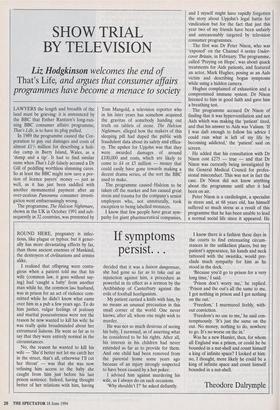If symptoms
persist.. .
ROUND HERE, pregnancy is infec- tious, like plague or typhus: but it gener- ally has more devastating effects by far, than those ancient enemies of Mankind, the destroyers of civilisations and armies alike.
I realised that offspring were conta- gious when a patient told me that his wife (common law, it goes without say- ing) had 'caught a baby' from another man while he, the common law husband, was in prison for an act of violence com- mitted while he didn't know what came over him in a pub a few years ago. To do him justice, vulgar feelings of jealousy and marital possessiveness were not the reason he now wanted to kill his wife: he was really quite broadminded about her extramural liaisons. He went so far as to say that they were entirely normal in the circumstances.
No, the reason he wanted to kill his wife — 'She'd better not let me catch her in the street, that's all, otherwise I'll cut her throat' — was that she was now refusing him access to the baby she caught from him just before his last prison sentence. Indeed, having thought better of her relations with him, having decided that it was a liaison dangereuse, she had gone so far as to take out an injunction against him, a procedure as powerful in its effect as a sermon by the Archbishop of Canterbury against the evils of football hooliganism.
My patient carried a knife with him, by no means an unusual precaution in this small corner of the world. One never knows, after all, whom one might wish to murder.
He was not so much desirous of seeing his baby, I surmised, as of asserting what he considered to be his rights. After all, his interest in his children had never extended as far as to provide for them. And one child had been removed from the parental home some years ago because of an injury strongly suspected to have been caused by a hot poker.
I advised him against murdering his wife, as I always do on such occasions. `Why shouldn't I?' he asked defiantly. I know there is a fashion these days in the courts to find extenuating circum- stances in the unlikeliest places, but my patient's appearance, his hands and neck tattooed with the swastika, would pre- clude much sympathy for him as he stood in the dock.
`Because you'd go to prison for a very long time,' I said.
`Prison don't worry me,' he replied. `Prison and the out's all the same to me. I got nothing in prison and I got nothing on the out.'
`Freedom,' I murmured feebly, with- out conviction.
`Freedom's no use to me,' he said con- temptuously. 'It's just the same on the out. No money, nothing to do, nowhere to go. It's no worse on the in.'
Was he a new Hamlet, then, for whom all England was a prison, or could he be bounded in a nut-shell and count himself a king of infinite space? I looked at him: no, I thought, more likely he could be a king of infinite space and count himself bounded in a nut-shell.
Theodore Dalrymple


























































 Previous page
Previous page